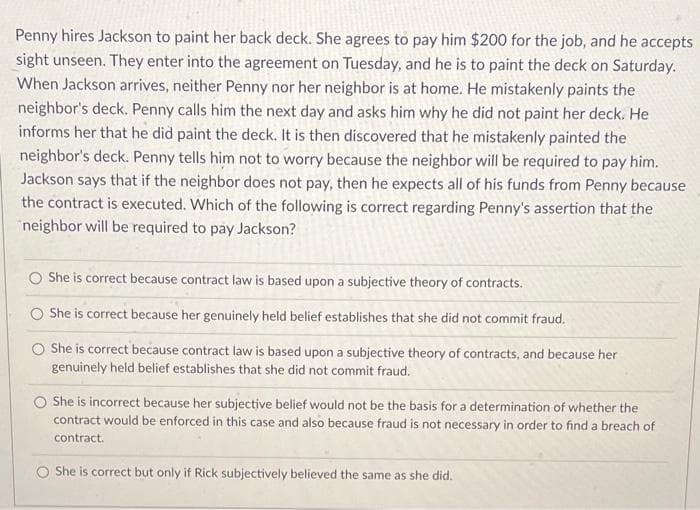Penny hires Jackson to paint her back deck. She agrees to pay him $200 for the job, and he accepts sight unseen. They enter into the agreement on Tuesday, and he is to paint the deck on Saturday. When Jackson arrives, neither Penny nor her neighbor is at home. He mistakenly paints the neighbor's deck. Penny calls him the next day and asks him why he did not paint her deck. He informs her that he did paint the deck. It is then discovered that he mistakenly painted the neighbor's deck. Penny tells him not to worry because the neighbor will be required to pay him. Jackson says that if the neighbor does not pay, then he expects all of his funds from Penny because the contract is executed. Which of the following is correct regarding Penny's assertion that the neighbor will be required to pay Jackson? O She is correct because contract law is based upon a subjective theory of contracts. She is correct because her genuinely held belief establishes that she did not commit fraud. O She is correct because contract law is based upon a subjective theory of contracts, and because her genuinely held belief establishes that she did not commit fraud. She is incorrect because her subjective belief would not be the basis for a determination of whether the contract would be enforced in this case and also because fraud is not necessary in order to find a breach of contract. She is correct but only if Rick subjectively believed the same as she did.
Penny hires Jackson to paint her back deck. She agrees to pay him $200 for the job, and he accepts sight unseen. They enter into the agreement on Tuesday, and he is to paint the deck on Saturday. When Jackson arrives, neither Penny nor her neighbor is at home. He mistakenly paints the neighbor's deck. Penny calls him the next day and asks him why he did not paint her deck. He informs her that he did paint the deck. It is then discovered that he mistakenly painted the neighbor's deck. Penny tells him not to worry because the neighbor will be required to pay him. Jackson says that if the neighbor does not pay, then he expects all of his funds from Penny because the contract is executed. Which of the following is correct regarding Penny's assertion that the neighbor will be required to pay Jackson? O She is correct because contract law is based upon a subjective theory of contracts. She is correct because her genuinely held belief establishes that she did not commit fraud. O She is correct because contract law is based upon a subjective theory of contracts, and because her genuinely held belief establishes that she did not commit fraud. She is incorrect because her subjective belief would not be the basis for a determination of whether the contract would be enforced in this case and also because fraud is not necessary in order to find a breach of contract. She is correct but only if Rick subjectively believed the same as she did.
Chapter8: Game Theory
Section: Chapter Questions
Problem 8.12P
Related questions
Question
J- 3

Transcribed Image Text:Penny hires Jackson to paint her back deck. She agrees to pay him $200 for the job, and he accepts
sight unseen. They enter into the agreement on Tuesday, and he is to paint the deck on Saturday.
When Jackson arrives, neither Penny nor her neighbor is at home. He mistakenly paints the
neighbor's deck. Penny calls him the next day and asks him why he did not paint her deck. He
informs her that he did paint the deck. It is then discovered that he mistakenly painted the
neighbor's deck. Penny tells him not to worry because the neighbor will be required to pay him.
Jackson says that if the neighbor does not pay, then he expects all of his funds from Penny because
the contract is executed. Which of the following is correct regarding Penny's assertion that the
neighbor will be required to pay Jackson?
She is correct because contract law is based upon a subjective theory of contracts.
She is correct because her genuinely held belief establishes that she did not commit fraud.
She is correct because contract law is based upon a subjective theory of contracts, and because her
genuinely held belief establishes that she did not commit fraud.
She is incorrect because her subjective belief would not be the basis for a determination of whether the
contract would be enforced in this case and also because fraud is not necessary in order to find a breach of
contract.
She is correct but only if Rick subjectively believed the same as she did.
Expert Solution
This question has been solved!
Explore an expertly crafted, step-by-step solution for a thorough understanding of key concepts.
This is a popular solution!
Trending now
This is a popular solution!
Step by step
Solved in 3 steps

Knowledge Booster
Learn more about
Need a deep-dive on the concept behind this application? Look no further. Learn more about this topic, economics and related others by exploring similar questions and additional content below.Recommended textbooks for you


Principles of Microeconomics
Economics
ISBN:
9781305156050
Author:
N. Gregory Mankiw
Publisher:
Cengage Learning


Principles of Microeconomics
Economics
ISBN:
9781305156050
Author:
N. Gregory Mankiw
Publisher:
Cengage Learning